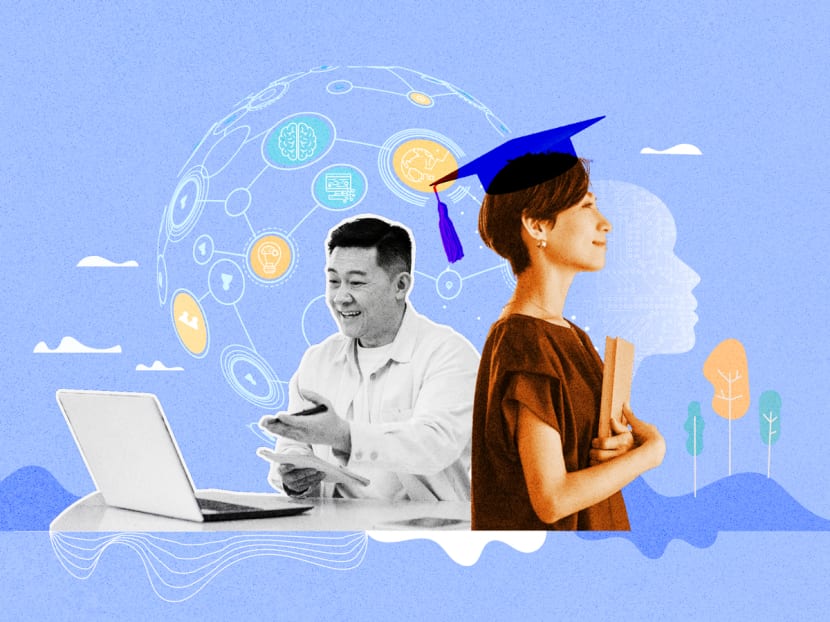Commentary: Going back to school in my mid-30s worried me, but my age and work skills are more useful than I thought
Despite recent efforts to change perceptions, being an adult learner can still be seen as a disadvantage — but that added life experience may actually provide an edge.

Despite initial concerns, the author now views his choice to return to school not as a step backwards, but rather a step in a different direction — one with the long-term potential to open many new doors.

This audio is AI-generated.
Despite recent efforts to change perceptions, being an adult learner can still be seen as a disadvantage. But upon returning to school to pursue a PhD last year, the author now sees that his real-life work experience has given him unique advantages in tackling present academic challenges.
Embracing education later in life comes with both rewards and challenges, both of which I’ve recently experienced firsthand.
Despite recent efforts to change perceptions, being an adult learner can still be seen as a disadvantage — but I’ve come to see how that added life experience may actually provide an edge.
After obtaining my master’s degree from Cambridge in June 2015, I embarked on a legal career as a solicitor at a US law firm and later transitioned to legal academia at the Singapore University of Social Sciences (SUSS).
In that time, I received a permanent lectureship, won two consecutive teaching awards, and published several papers. But still, I felt a strong desire to challenge myself further by pursuing a PhD in my mid-30s.
Returning to Cambridge in September 2023, I discovered a transformed educational landscape.
Today, students everywhere have a vast array of online resources at their disposal, such as digital textbooks, advanced academic search engines, enhanced reference organisation through automatic citation capture, and even artificial intelligence-powered research tools.
As someone who prided myself on being tech-savvy in my formative years, I found myself working hard to play catch-up with my younger classmates, most of them in their mid-20s and already tuned in to new developments, navigating new tools and resources with ease.
Over time, however, I began to appreciate the unique advantages that my accumulated years of professional experience have given me in tackling my present academic challenges.
REAL EXPERIENCE, REAL SKILLS
Having spent many years in academia honing my research skills, I was already well familiarised with the process of conducting rigorous research, critically analysing materials, and presenting findings in a logical manner.
Years of teaching have also taught me the importance of having clear objectives and deliverables, a skill that has been invaluable in mapping out my doctoral research goals.
My experience as a solicitor in a fast-paced environment also equipped me with the ability to pay close attention to detail and think critically about complex concepts, all while under great pressure.
Working in various areas of corporate practice and as course leader for the law of business organisations module also enabled me to develop a broad understanding of the international legal and regulatory landscape.
This knowledge has been invaluable in informing my PhD research and identifying real-world areas where my work can make a meaningful contribution.
I have also been able to connect with other mature students pursuing advanced degrees at Cambridge, and hear their stories and share our hopes and fears about returning to school later in adulthood.
One such peer, who already has an established professional career in his field, is pursuing a PhD to combine his professional expertise with academic perspectives. His goal is to become either an academic or a research consultant after completing his doctorate, leveraging his unique blend of practical experience and scholarly knowledge.
Stories like his have further inspired me to view lifelong learning not just as an avenue for acquiring new skills, but also to find new ways to synthesise and synergise existing knowledge with new insights.

SCHOOLING PROBLEMS
Nevertheless, going back to school as an adult learner still has its considerations.
Firstly, going back to school can be expensive.
Later this month, I will be awarded a mid-term scholarship by the Ministry of Education under the Singapore Teaching and Academic Research Talent scheme.
This partial sponsorship will be crucial in alleviating the financial stress of the next few years of study, but self-funding my first year required many personal sacrifices.
I had to sell my car and dip into my hard-earned savings. I also had to reconcile myself with having to delay settling down and starting a family.
Secondly, adjusting to student life after years in the workforce certainly requires a significant mindset shift.
Embarking on a new educational journey means stepping out of one's comfort zone and facing uncertainties, which can be uncomfortable for older individuals on well-established career paths who are especially fond of familiarity and stability.
Third, as much as we’ve seen lifelong learning advocated and encouraged in recent years, societal norms still largely dictate that upon completing one’s formal education by a certain age, we’re expected to focus on growing our careers and families.
Deviating from this status quo by pursuing further education later in life may still raise some eyebrows.
WORTHY INVESTMENT
It’s only natural to worry that such a choice may be a step backwards, especially when one’s peers are achieving professional milestones, accumulating wealth, and raising families.
My own conversations with friends and peers who are working full-time have sometimes caused me to feel a sense of apprehension on my own choices.
I’m also aware that pursuing a PhD in my mid-30s means that I have a slightly shorter career runway after completing my degree compared to my peers who are a decade younger.
Despite my initial concerns, I’ve now come to view it as a worthy investment in new perspectives and experiences that will undoubtedly enhance and strengthen my performance in a future role.
It’s not a step backwards, but rather a step in a different direction — one with the long-term potential to open many new doors for me.
I’ve also found renewed appreciation and empathy for the challenges faced by many of my own older students who are in their 30s, 40s, and 50s. Their concerns about restarting careers, navigating unfamiliar landscapes, and securing promising futures post-graduation are no longer just abstract concepts, but palpable realities.
In the face of these challenges, our shared commitment to the pursuit of knowledge is a testament to the immense potential for growth through education.
In a rapidly changing world characterised by technology advancement and job market volatility, lifelong learning will continue to become increasingly essential. However, it is a challenging journey that requires courage, resilience, and a growth mindset.
Regardless of our age or stage in life, let’s seek to embrace the challenges, celebrate the victories, and never stop growing.
ABOUT THE AUTHOR:
Ben Chester Cheong is a PhD candidate at the University of Cambridge. He is a law lecturer at the Singapore University of Social Sciences, and a lawyer at RHTLaw Asia.








